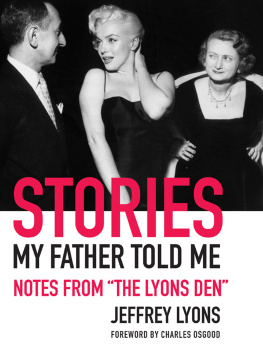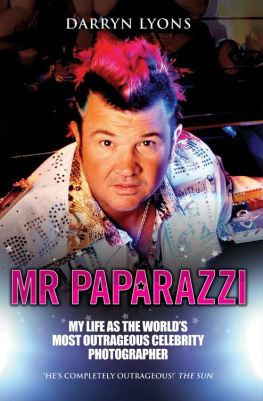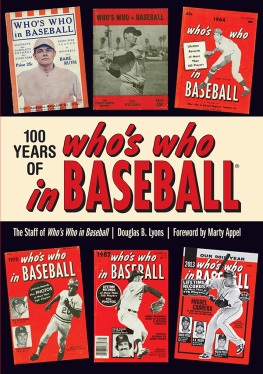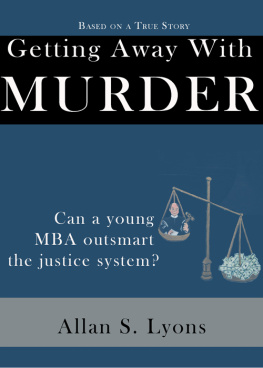
PP. 23
My father on his beloved terrace overlooking New Yorks Central Park, circa 1966.
EDITOR: Walton Rawls
PRODUCTION EDITOR: Michaelann Millrood
COPYEDITOR: Ashley Benning
DESIGNER: Misha Beletsky
PRODUCTION MANAGER: Louise Kurtz
Text copyright 2011 Jeffrey Lyons. Compilation, including selection of text and images, copyright 2011 Abbeville Press. All rights reserved under international copyright conventions. No part of this book may be reproduced or utilized in any form or by any means, electronic or mechanical, including photocopying, recording, or by any information retrieval system, without permission in writing from the publisher. Inquiries should be addressed to Abbeville Press, 137 Varick Street, New York, NY 10013. Printed and bound in China.
First E-book Edition: June 2011
E-book ISBN:978-07892-6001-7
The print edition of this book is cataloged as follows:
Library of Congress Cataloging-in-Publication Data
Lyons, Jeffrey.
Stories my father told me : notes from The Lyons Den / Jeffrey Lyons. 1st ed.
p. cm.
ISBN 978-0-7892-1102-6 (hardback)
1. CelebritiesAnecdotes. 2. CelebritiesInterviews. 3. Biography20th centuryAnecdotes. 4. Lyons, Leonard, 1906-1976.Anecdotes. I. New York post. II. Title.
CT120.L96 2011
920.71dc22
2010048256
For bulk and premium sales and for text adoption procedures, write to Customer Service Manager, Abbeville Press, 137 Varick Street, New York, NY 10013, or call 1-800-ARTBOOK.
Visit Abbeville Press online at www.abbeville.com.
PHOTOGRAPHY CREDITS
All photographs are from the Lyons family archive, with the exception of the following:
Cover and page 234: Sam Shaw; pages 23: Ben Martin; pages 1011: Sam Shaw; page 13: Daniel Grossi; page 16: Bill Mark; page 49: Look magazine; page 52: Dunman Photos; page 55: Look magazine; page 106: Bill Mark; page 137: Gustave W. Gale; page 149: Libsohn-Ehrenberg; page 153:Jay Seymour, Gary Wagner Associates; page 94: Ben Martin; page 235: Sam Shaw; page 251: Bill Mark; page 252: Otto Rothschild; pages 26667:Horace Sutton; page 280: Agenzia Pieriuggi; page 294: Lawrence Schiller, Credit Alskog, Inc.; pages 296, 301, 305, 309, 310, 313, 315, 317, 319, 321, 322, 324, and 326: Reel Talk
We hope you enjoy this book from Abbeville Press. To write to the author or see our other titles, click here . (This link will open your devices web browser.)
This is a testament to my fathers lifes work.
This is also for my wife Judy, our son Ben, and daughter Hannah, the three most important people in my life. If nothing else, they put up with my eccentricities and my foibles; I dont deserve them.
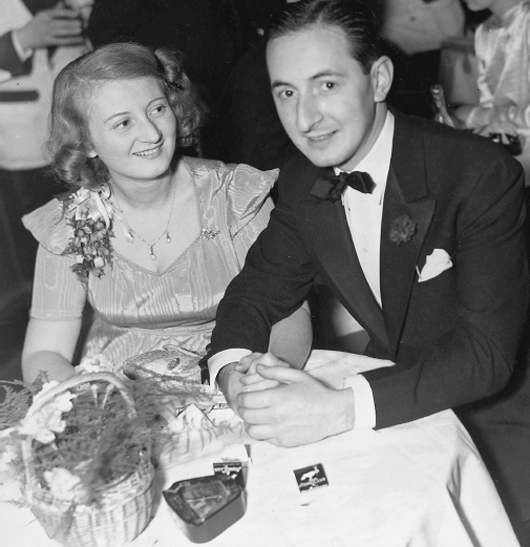
My parents holding hands during a night out at the Stork Club circa 1940.
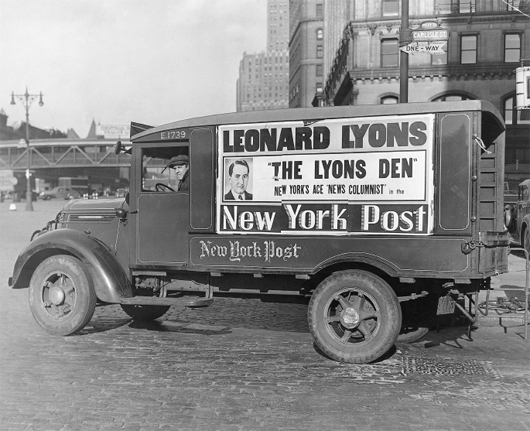
How the paper promoted the column in the 1930s, just outside the Post building.
CONTENTS
THE NEXT
GENERATION
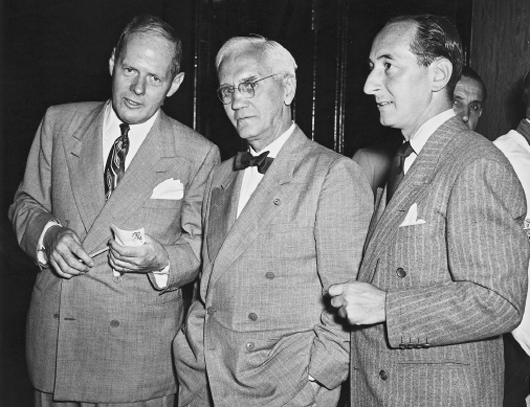
With Stork Club owner Sherman Billingsley and Sir Alexander Fleming, discoverer of penicillin, circa 1950.
FOREWORD
By Charles Osgood
In 1999 my CBS Sunday Morning TV program marked the 100th anniversary of the birth of Ernest Hemingway with a broadcast from Finca Vigia, the Havana home where the great writer lived for twenty years. When I got home to New York, a neighbor in my apartment building told me he especially enjoyed that show because hed been to Finca Viga with his father to visit with Hemingway, and that Papa (Hemingway) himself had taught him to shoot. How many people do you know who could say that?
That neighbor is Jeffrey Lyons, the gifted writer, critic, television commentator, and author of this book. Jeffreys father was the incomparable Leonard Lyons, who over a span of forty years between 1934 and 1974 wrote a column called The Lyons Den which was published in the New York Post and in 105 other newspapers around the world. These columns contained fascinating anecdotes about movie stars, Broadway performers, ballplayers, comics, singers, songwriters, painters, poets, politicians, presidents, dictators, restaurateurs, all sorts of people. Leonard Lyons disliked the word celebrity. He used to say that if his sister in Brooklyn became newsworthy hed write about her. And when she did, he did.
Leonard Lyons was a lawyer by training. He got the job as columnist beating out five hundred other applicants after writing for the English page of the Jewish Daily Forward. The Lyons Den was decidedly not a gossip column. Lyons did not write about who was running around, as George Burns used to put it, with whom, who was cheating or being cheated on, or who was arrested again for drunk driving or drug possession. You might find that sort of thing in Walter Winchells or Earl Wilsons column, but never in The Lyons Den. Jeffreys father believed, as do I, that good journalism does not require that you keep your fangs bared or your claws unsheathed. Lions might do that but not Lyons. It was not his objective to embarrass the people he wrote about or destroy their reputations. Like Charles Kuralt, Leonard Lyons genuinely admired the people he wrote about. And knowing this they would open up to him and tell him the colorful stories that were his bread and butter, and that the readers loved.
Jeffrey tells me that unlike the other big columnists, his father had no leg man to gather information for him. He made daily and nightly rounds of New York watering holes himself for all those years. He didnt drink with the in crowd; in fact he was a teetotaler. If he saw another columnist in a restaurant he would leave because he wanted all the stories in his column to be exclusive. In those days the word meant something.
In the 12,479 columns Lyons turned out, over those four decades more than one thousand people were named, including some of the most famous people in the world, many of whom would became his friends. It seemed to Jeffrey and his three brothers that their father knew everybody who was anybody. What their father taught them was that everybody is somebody. Imagine what it must have been like for them growing up with parents like theirs. Former New York Mayor Lindsay said in his eulogy of Leonard Lyons: In a business of sharks, he was a prince.
I never met Leonard Lyons. But my neighbor Jeffrey and his brother Doug obviously inherited some of his friend-making and storytelling gifts. Jeffrey is the only person I know whose telephone is answered by Joe DiMaggio.
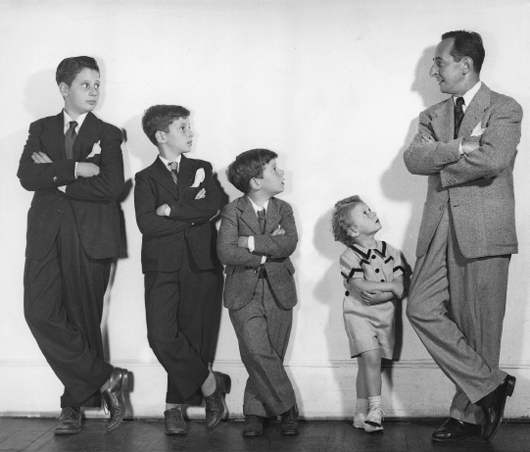
My father and his pride of Lyons, circa 1950. I am in the grey suit, and neither my younger brother Douglas nor I have quite mastered the correct position of our feet.
INTRODUCTION
One day when I was in fifth grade, the members of my class were asked to stand in turn and tell what their fathers did for a living. (Back then, there were few working mothers.) I remember hearing: lawyer, doctor, investment banker, painter, musician. Then came my turn, and I said: Columnist. No one seemed to know what that meant, so I said: My father writes about all
Next page
